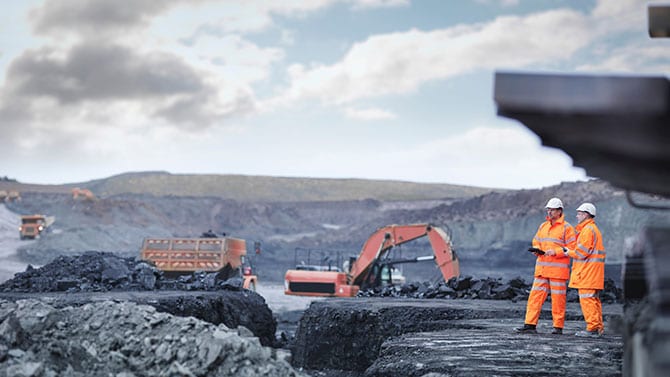A critical role in net zero shift
The accelerating transition to net zero is heavily impacting the mining and metals sector, which will need to provide the resources critical for a greener economy.
The electric vehicle revolution is underway and solar and wind energy capacity is expanding rapidly – the International Energy Agency (see source 1) predicts that, by 2026, electricity from renewables will equal the 2020 global power capacity of “fossil fuels and nuclear combined”. These developments will drive rising demand for battery metals, rare earths, copper and iron ore.
The industry also stands to reap other rewards as the world moves to embrace ESG. Across every industry, companies with higher ESG ratings are expected to generate stronger long-term shareholder and market value, and are expected to be rewarded through access to new and lower-interest capital.
We need to talk about the future of mining
A report that brings together insights and perspectives on the disruptive forces that could transform the mining sector
How will the industry adapt to the changing world?
Compared to many other industries, mining and metals weathered the COVID-19 pandemic well. The sector on average emerged from the pandemic with stronger balance sheets and available free cash flow on the back of higher commodity prices. The coming years will be critical for the industry as it continues to support the global energy transition and responds to stakeholder demands to integrate ESG into business strategies. How the industry responds will help build trust and business growth, and companies that get this right will position themselves best to succeed in the net zero transition.
Key trends impacting the industry
- Growing demand for new minerals
- Availability of free cash flow
- Acting on ESG delivers long-term value
- Tax transparency helps to build credibility
- ESG thinking opens new opportunities to grow through mergers
Growing demand for new minerals
Clean energy technologies critical in the global transition to net zero will require more mineral inputs. The International Energy Agency predicts that the world will need six times as much of those minerals by 2040 (source 3) to achieve net zero by the mid-century. Some minerals will require even greater increases in production. For example, demand for lithium for electric vehicles and other batteries is projected to grow more than 40-fold by 2040. Other high-demand minerals include graphite, cobalt, nickel and copper. For miners, the exploration and development of sites for these mineral groups will pose both a challenge and an opportunity.
Availability of free cash flow
Strong balance sheets, record commodity prices and prudent capital management have helped the mining and metals sector to deliver outstanding results well ahead of forecasts. This leaves miners in an enviable position. However, there remains a choice on how they can make best use of the cash generated. Do they double down on their existing asset base by relying on the abundance of cheap debt and free cash flow? Or will they take a strategic step to shift towards decarbonisation and an ESG agenda, adding assets that will put them ahead of the next mining boom?
Acting on ESG delivers long-term value
Mining companies that embrace ESG as a core part of their business strategy will enjoy the greatest opportunities for sustainable growth, long-term value creation and maintaining a social licence to operate. We have seen companies with higher ESG ratings show better market performance and outperform the broader market, delivering shareholder returns that averaged 10% higher than the general market index. In addition, improved sustainability provides a way to differentiate operations and products on the market – for example, low-carbon aluminium can command a premium price. Finally, with a growing number of investors prioritising ESG, high-scoring mining companies can gain better and lower-priced access to capital.
Tax transparency helps to build credibility
For many mining companies, the taxes they pay can be the largest contribution they make to ESG. While 39% of industry CEOs are concerned about tax policy uncertainty, only 30% of the top 40 companies adopted tax transparency reporting in 2020. Increasing tax transparency provides mining companies with an opportunity to reap significant benefits. For example, a company can build its reputation in the communities where it operates by highlighting the social benefits that its taxes help to support. Organisations that are open about their tax strategies and governance also have greater appeal to ESG-focused investors. Tax transparency can even give companies the opportunity to have more say in developing local and regional tax policies.
ESG thinking opens new opportunities to grow through mergers
Mining companies have an opportunity to build value by viewing mergers and acquisitions opportunities through an ESG lens. This means looking for assets that not only meet traditional industry benchmarks but feature low-carbon footprints, have links with government and support local communities. Such assets can help companies meet their net zero goals and provide solid returns on investment by strengthening their position in expanding markets for green technologies. Organisations also have room to grow through looking for deals involving battery minerals and rare earth elements, which are seeing rising demand.
Featured content

Global Mine 2022
PwC's annual report on global mining explores whether or not the Top 40 mining companies can prioritise ESG and take a leading role in the world’s clean energy transition.








